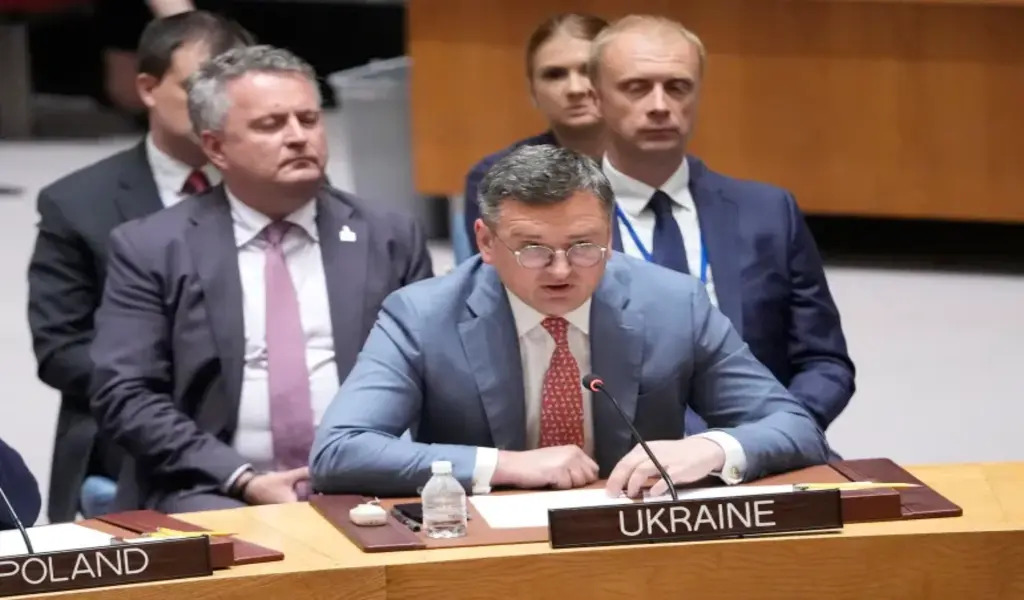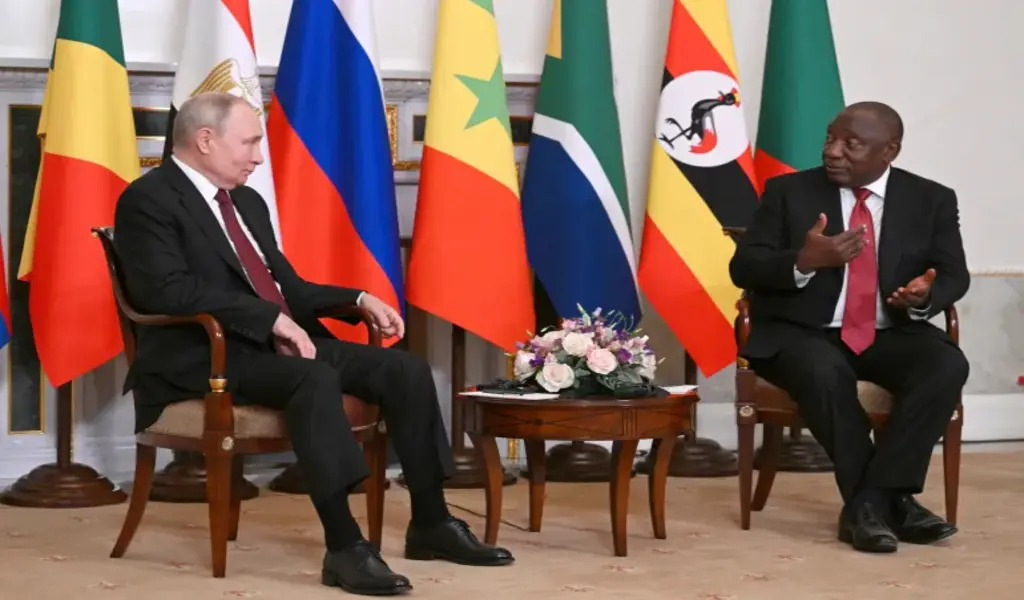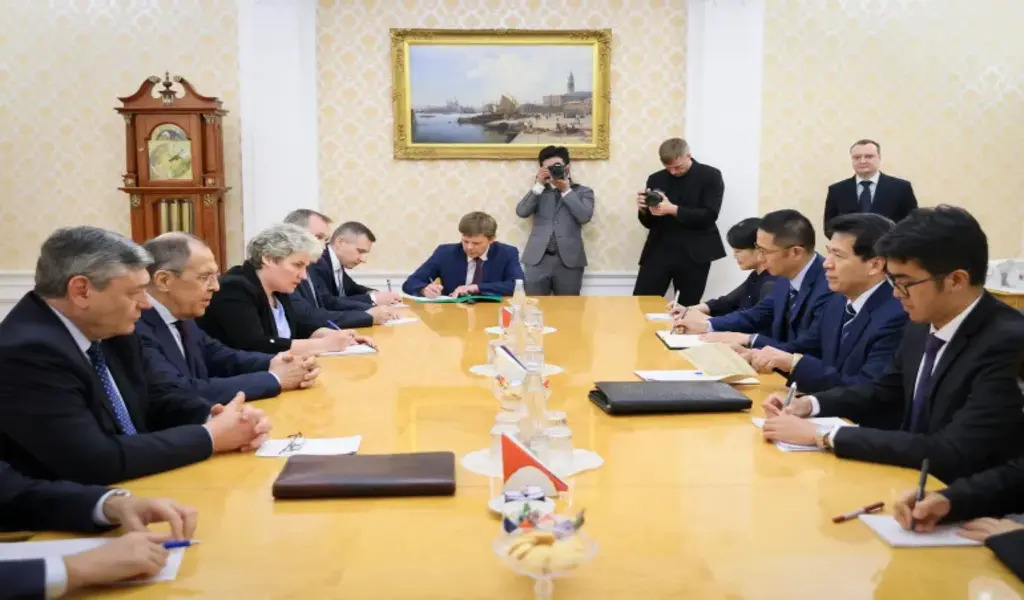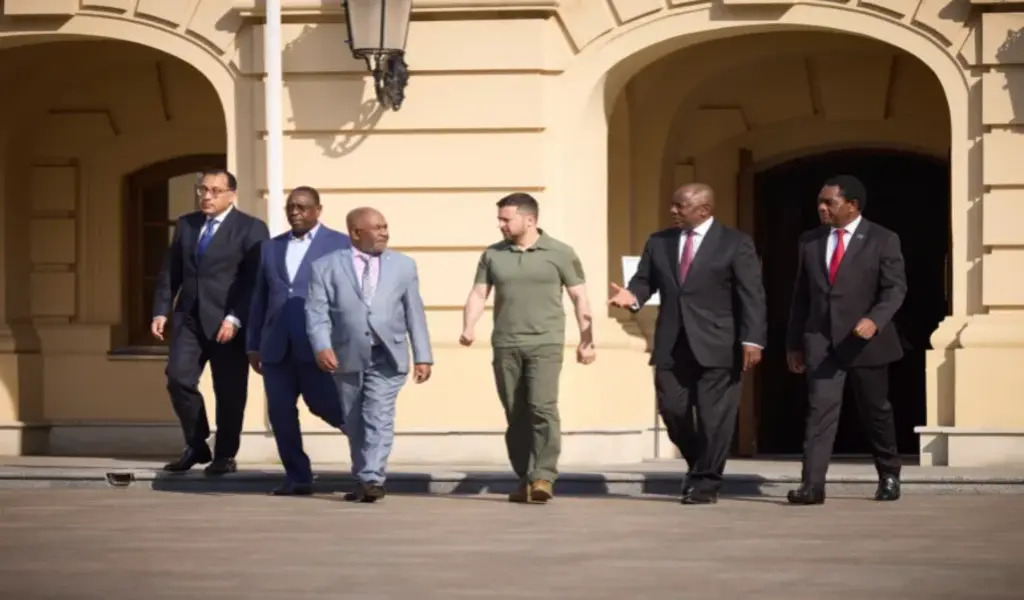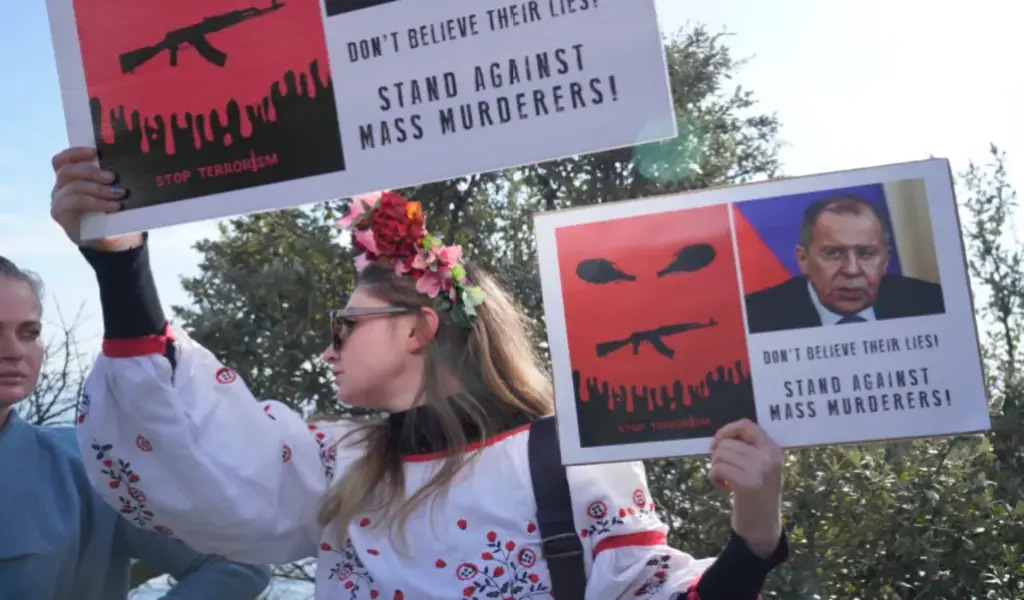Ukraine War
Seeking Peace In Ukraine: The Role Of African And Chinese Initiatives Amidst Geopolitical Tensions
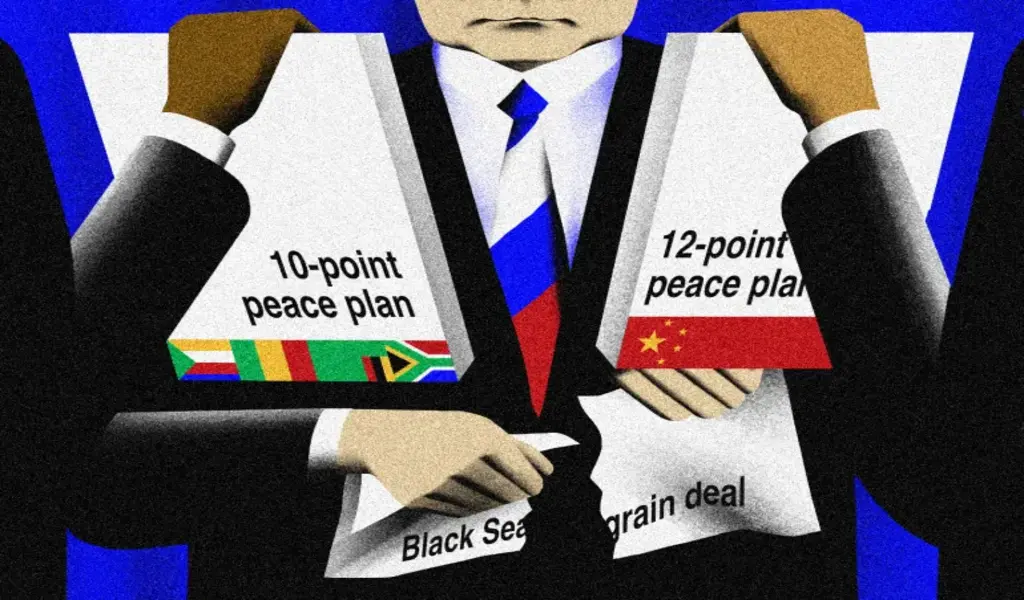
(CTN NEWS) – In the colossal amphitheater of St. Petersburg, on the eve of July 27th, the dignitaries of African nations converge, their footsteps resonating with the essence of history, to exchange cordial greetings with the venerable Russian statesman, President Vladimir Putin.
Around them, grandiose banners and hoardings narrate tales of yore, commemorating the enduring bonds between the African continent and the illustrious city of Moscow.
Beneath the veneer of amicable camaraderie, however, lurks a subtle aura of unease, shrouding the second iteration of the Russia-Africa summit – a sequel to its 2019 predecessor.
The harmonious proceedings are cast in the somber hues of the ongoing Ukrainian conflict, an intractable maelstrom that has engulfed the region for a formidable span of 18 months.
The nexus of cultures, once illuminated by the exchange of pleasantries and symbolic gestures, now stands juxtaposed against the backdrop of geopolitical complexities and global tensions.
This confluence of minds, where enigmas abound, holds the promise of shaping the destiny of continents and nations alike, as the wheels of diplomacy continue to turn in the realm of uncertainty and intrigue.
The Geopolitical Dance: Africa and China’s Peace Initiatives Amidst the Ukraine-Russia Conflict
In the warm embrace of June, the presidents of South Africa, Senegal, Comoros, and Zambia embarked on a momentous journey to St. Petersburg, where they sought an audience with the esteemed Russian President Vladimir Putin.
Their enthralling 10-point peace plan held the noble ambition of persuading both Ukraine and Russia to step forth into the realm of negotiations.
The charismatic Senegalese leader, Macky Sall, later revealed that they implored Putin to manifest his genuine commitment to pursuing peace before the grand spectacle of the St. Petersburg summit.
However, fate took an enigmatic twist as the pages of time turned, and a month later, Putin’s actions seemed contrary to the spirit of peace.
He decided to withdraw from the Black Sea grain deal, a crucial lifeline for African nations that heavily rely on Ukrainian wheat and maize exports via the sea route.
Across the vast expanse of 6,000 kilometers (3,728 miles) in the southeast, in Beijing, China unfurled its own grand design for peace – a 12-point peace plan, articulated with hope to bring an end to the devastating war.
Alas, akin to the endeavors of the African leaders, China’s noble endeavors have yet to sway Putin from his ruthless assault on Ukraine or convince Kyiv to embrace the path of reconciliation.
Initially, the world marveled at the African and Chinese peace initiatives, with the international community yearning for an end to the conflict amidst soaring energy prices, food scarcities, and runaway inflation.
Empowered by the unwavering support of the Western world for Ukraine, countries and alliances hailing from the Global South arose as potential peace mediators, signaling a potential reconfiguration of the once United States-led international order.
Yet, one must ponder: Can Africa or China truly bring an end to this protracted war? Do they possess an unwavering will to terminate the strife? And, indeed, do Russia and Ukraine genuinely entertain the idea of engaging with them in the pursuit of peace?
In concise terms, the prospects of immediate peace negotiations seem bleak. Neither Ukraine nor Russia seems inclined to relinquish territory, and the chasm of irreconcilable differences obstructs any glimmer of dialogue.
Consequently, the current impact of the Chinese and African initiatives appears nominal.
However, seasoned analysts predict that eventually, genuine deliberations must transpire.
When the time is ripe for negotiation, China’s sway over Russia and Africa’s impartiality could render them uniquely suited to broker a meaningful dialogue between Kyiv and Moscow.
Only then may the dance of geopolitics find its elusive rhythm towards resolution and tranquility.
A Daunting Path: The African Peace Plan in the Face of Russian and Ukrainian Rejection
As air sirens blared, echoing the turmoil that gripped the Ukrainian capital, the peace delegations of South Africa, Senegal, Comoros, and Zambia hurriedly sought refuge in a bomb shelter.
Led by their respective presidents, this African team had arrived in Kyiv with a lofty mission – to engage Ukrainian President Volodymyr Zelenskyy and present their comprehensive plan aimed at quelling Russian aggression and ushering in peace to the war-torn nation.
While talks unfolded amidst the haunting backdrop of missile strikes, the 10-point peace plan emerged, adorned with both overarching and specific proposals.
Among them, a call for mutual respect and understanding between the conflicting parties and the solemn recognition of state sovereignty as enshrined in the United Nations Charter.
Additionally, the liberation of prisoners of war was identified as a crucial step towards reconciliation.
Moreover, the plan boldly articulated the imperative for unimpeded trade routes in the Black Sea, a vision that assumed greater relevance amid Russia’s relentless bombardment of Ukrainian ports, particularly Odesa and Chornomorsk, where the lifeblood of Ukrainian grain exports coursed.
Alas, at a press conference graced by the visiting African leaders – South African President Cyril Ramaphosa, Senegalese President Macky Sall, Zambian President Hakainde Hichilema, and Comoros President Azali Assoumani – the Ukrainian leader subtly brushed aside their peace proposal.
Zelenskyy asserted that Kyiv would only entertain the prospect of peace following an unequivocal Russian withdrawal from Ukrainian territory.
Undeterred, the African leaders then journeyed to St. Petersburg for a rendezvous with President Vladimir Putin. In the pursuit of peace, South African President Ramaphosa emphasized the urgency to conclude this protracted war through diplomatic means and negotiations.
Commending the African presidents for their balanced stance, Putin, however, interjected, implying that their proposals were misguided, especially the notion holding Russia responsible for the surge in global food prices in 2022.
Putin conveyed to the delegation that the majority of Ukrainian grain exports from Black Sea ports had found their way to affluent nations.
The Kremlin’s spokesman, Dmitry Peskov, voiced reservations, suggesting that realizing the African plan would be an arduous endeavor.
Could the tide of rejection from both Russia and Ukraine alter its course?
Gustavo de Carvalho, a distinguished researcher on Russia-Africa relations at the South African Institute of International Affairs, opines that African nations must delve deeper beyond their peace proposal.
They ought to assess their perception in Ukraine, particularly, to ascertain the prospects of their mediating efforts.
The Perceptual Shift: Africa’s Advantage in the Quest for Peace
Since the complete invasion of Ukraine by Russia in February 2022, a notable trend has emerged among African nations – a conspicuous abstention from condemning Moscow in UN resolutions denouncing the war.
However, to pave the way for their earnest peace plan to be genuinely considered by Kyiv, African nations must surmount the perception that they are intrinsically “pro-Russia,” as highlighted by Gustavo de Carvalho, an esteemed researcher on Russia-Africa relations.
Quietly and steadily, African nations have been reevaluating their postures, seeking to redefine their stance.
For example, in their earnest call for the sovereignty of states in alignment with the UN Charter, the African peace plan has triggered a shift in how nations like South Africa view the conflict.
It sought to incorporate the Ukrainian perspective and fostered a more pro-Ukraine outlook, as pointed out by de Carvalho in an interview with Al Jazeera.
Despite historical ties between South Africa and Russia, anchored in Moscow’s support during the apartheid era, the peace plan underscores a considerable alignment with Ukraine’s interests.
South African President Cyril Ramaphosa exemplified the nation’s commitment to its principles when he took a firm stance regarding Russian President Putin’s participation in the Brazil-Russia-India-China-South Africa summit, hosted by Johannesburg in August.
With the International Criminal Court (ICC) having issued an arrest warrant for Putin in relation to the Ukraine war, South Africa, as an ICC signatory, faced the obligation to apprehend the Russian leader should he attend the summit.
In the past, South Africa had overlooked such responsibilities, as seen during the visit of then-Sudanese leader Omar al-Bashir in 2015, despite an ICC warrant.
This time, however, Ramaphosa stood his ground and successfully convinced Putin to refrain from attending, with Russian Foreign Minister Sergei Lavrov representing Moscow instead.
As economic ramifications of the prolonged conflict exacerbate crises in numerous African nations, ideological positions inevitably yield to pragmatism.
The war’s impact on global food prices has disproportionately affected Africa, a continent heavily reliant on Russian and Ukrainian wheat imports.
The collapse of the Black Sea grain deal has further exacerbated food shortages, heightening the urgency for an early end to the war.
Though African nations possess limited influence in the realm of geopolitics, this very fact endows them with credibility as potential mediators.
While the prospects of an immediate peace agreement may seem remote, in the long run, the mantle of responsibility might eventually fall upon a party perceived to be less entrenched in the conflict.
Thus, the Global South, including Africa, stands poised to engage with initiatives that could pave the path to resolution.
China, the Mandarin Mediator: An Enigmatic Role in the Ukraine Conflict
As African nations boast distance from the conflict, offering a unique perspective in negotiations, China presents a different allure for those seeking to persuade Russia to cease the war.
Holding the mantle of being Russia’s largest benefactor, China has bolstered its northern neighbor’s economy through substantial oil purchases and robust trade, extending political cover to Moscow at international forums like the UN Security Council.
Despite European nations’ persistent entreaties for China to employ its influence in urging Putin’s troop withdrawal from Ukraine, it was only in March that China unveiled its peace plan.
This initiative followed a momentous breakthrough in mediating Saudi Arabia and Iran’s longstanding conflict – a testament to China’s escalating aspirations for a prominent role in global conflict resolution.
Notably, China has also extended its mediation offer to Israel and Palestine, hosting Palestinian President Mahmoud Abbas in June.
However, unlike its other mediation endeavors, China’s peace plan for the Ukraine war adopts a broad, nebulous stance, leaving room for interpretation.
The call for both Russia and Ukraine to abandon their “cold war mentality,” cease hostilities, and resume peace talks, while sensible, lacks compelling arguments to persuade two nations embroiled in a devastating conflict to disarm.
According to some analysts, China’s previous peace initiatives were primarily in long-standing conflicts where peace served to safeguard its vested interests.
Notably, Saudi Arabia and Iran hold strategic significance for China, and improved relations between them mitigate risks to Chinese investments in these nations.
However, the dynamics differ in the Ukraine war. Currently, China stands to benefit not from peace but from a “prolonged war” that depletes the resources of Western powers and bolsters lucrative bilateral trade with a vulnerable and isolated Russia.
In the Global South, there exists a certain degree of “wishful thinking” regarding China’s perceived role as a mediator acting in good faith.
This sentiment arises from a desire for an alternative to the prevailing global order, which many countries in the Global South hold grievances against.
Nonetheless, Niva Yau, a nonresident fellow with the Atlantic Council’s Global China Hub, asserts that China may not be the answer in this case.
Yau posits that a protracted war allows China to “distract the world” and foster a facade of neutrality amid conflict. Such a stance could potentially pave the way for future military endeavors, including actions related to Taiwan, which Beijing considers an integral part of Chinese territory.
Despite China’s vested interests in maintaining Russia’s stability to a certain extent, should Russia face mounting military, economic, and geopolitical setbacks bordering on collapse, the world recognizes that only China possesses the influence to persuade Putin towards a negotiated settlement before it’s too late.
Thus, China’s role as the enigmatic Mandarin Mediator remains a subject of complex calculations and geopolitical intrigue in the midst of the Ukraine conflict.
Ukraine’s View on Mediation Efforts: Upholding Territorial Integrity and Pursuing Justice
Similar to Africa, Ukraine perceives China as non-neutral in the conflict, and though it maintains diplomatic channels with both China and the African leaders, it has yet to embrace their peace roadmaps.
Ukraine’s Foreign Minister Dmytro Kuleba made it clear during his meeting with China’s special representative for Eurasian affairs, Li Hui, that any proposals involving territorial loss or the freezing of the conflict are unacceptable to Kyiv.
Furthermore, Ukraine remains dismissive of other mediation suggestions from the Global South, such as Brazilian President Luiz Inácio Lula da Silva’s proposal for a ‘peace club’ comprising India, Indonesia, China, and other Latin American countries.
Instead, Ukraine insists on its own peace plan, demanding the full recapture of territories occupied by Russia at present.
At international forums, including discussions with the African and Chinese parties, Ukraine vigorously advocates for its peace plan, which not only prioritizes regaining lost territory but also calls for holding Russian leaders and military officials accountable for the illegal invasion and alleged war crimes.
This crucial aspect of justice is an area where African nations and China may not share Ukraine’s perspective.
Oleksandra Matviichuk, representing Ukraine’s Center for Civil Liberties and a recent recipient of the Nobel Peace Prize, emphasizes that sustainable peace involves living without fear and having a long-term perspective.
However, she asserts that such a vision remains elusive for Ukraine unless Russian leaders and military officers face consequences for their actions.
Matviichuk underscores the necessity of ending the “circle of impunity” that allows Moscow to pursue its geopolitical goals through war crimes and advocates for an international tribunal to hold Russian war criminals accountable.
For Ukraine, any viable peace settlement must safeguard its territorial integrity and secure justice for the alleged war crimes committed during the conflict.
The pursuit of accountability remains a paramount concern, setting it apart from the mediation efforts put forth by the Global South.
Cracks in the Kremlin’s Influence: Signs of Russia’s Diminished Sway Over Africa and China
Hope for the realization of accountability for Russian actions in Ukraine remains uncertain, but indicators of the Kremlin’s waning influence in its relations with Africa and China are increasingly evident, contrasting with Moscow’s worldview.
Notably, South Africa’s insistence that Putin refrain from attending the Brazil-Russia-India-China-South Africa summit showcased the Kremlin’s diminishing sway.
Additionally, a telling remark from a senior Chinese official further underscored Russia’s weakened ability to influence Beijing’s stance.
When asked about supporting a return to Ukraine’s 1991 borders, China’s ambassador to the European Union, Fu Cong, responded with a nonchalant “Why not?”
Interestingly, Russia has largely embraced China’s peace plan, which Putin lauded as correlating with the Russian Federation’s perspective.
During the visit of China’s envoy for Eurasian affairs, Li Hui, to Moscow in May, Russian Foreign Minister Lavrov commended Beijing’s “balanced position” on the war and its willingness to play a constructive role in the conflict’s resolution.
However, Russia’s response to the African proposal remained lukewarm. Lavrov acknowledged that Moscow shared the “main approaches” of the plan, yet Putin’s impatience during his meeting with African leaders at the St. Petersburg summit suggested some discontent.
Amidst these developments, Putin finds himself once again facing many heads of state from the African continent. The recent withdrawal from the grain export deal may test Africa’s patience with Russia, revealing that the Kremlin’s grip on the region may be slipping.
The geopolitical landscape is evolving, and signs of Russia’s declining influence in its engagements with Africa and China are becoming increasingly evident, setting the stage for a recalibration of power dynamics in the global arena.
RELATED CTN NEWS:
Urgent Appeals: Calls To Halt Imminent Executions In Singapore For Drug-Related Convictions
China And Russian And Delegation To Attend North Korea’s Korean War 70th Armistice Anniversary
Unraveling The Enigma: A Pinnacle Hearing On UFOs And Government Secrets

